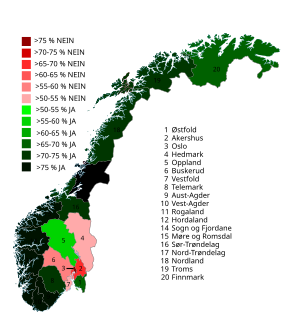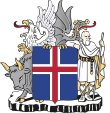
A referendum on introducing prohibition was held in Norway on 5 and 6 October 1919. Partial prohibition had been in effect since 1917, and the prohibition proposal did not include all types of alcohol, only spirits. The proposal was approved by 61.6% of voters. A second referendum on whether the prohibition should be maintained was held in 1926, resulting in an overturning of the law.

A referendum to approve the Évian Accords ending the Algerian War and granting self-determination to Algeria was held in France on 8 April 1962. It was approved by 90.8% of voters with a 75.3% turnout.
A constitutional referendum was held in Iceland between 20 and 23 May 1944. The 1 December 1918 Danish–Icelandic Act of Union had granted Iceland independence from Denmark, but maintained the two countries in a personal union, with the King of Denmark also being the King of Iceland. In the two-part referendum, voters were asked whether the Union with Denmark should be abolished, and whether to adopt a new republican constitution. Both measures were approved, each with more than 98% in favour. Voter turnout was 98.4% overall, and 100% in two constituencies, Seyðisfirði and Vestur-Skaftafjellssýsla.
A referendum on the prohibition of alcohol was held in Iceland on 10 September 1908, alongside parliamentary elections. In the first referendum to be held in the country, voters were asked whether they approved of a ban on importing alcohol. It was approved by 60.1% of voters but was overturned by a second referendum in 1933.
A referendum on the Act of Union with the Kingdom of Denmark was held in Iceland on 19 October 1918. Voters were asked whether they approved of the Act, which would lead to Iceland becoming a separate kingdom under the Danish Crown, making the country a sovereign state in a personal union with Denmark. It was approved by 92.6% of voters.
A referendum on prohibition was held in Finland on 29 and 30 December 1931. Voters were asked whether they approved of the continuation of the prohibition law passed in 1919. Of the three options presented, the complete abolition of prohibition was backed by 70.5% of voters with a turnout of only 44.4%.
A referendum on community service was held in Iceland on 21 October 1916. Voters were asked whether they approved of introduction of compulsory community service. It was rejected by 91.8% of voters.

A referendum on introducing an alcohol tax was held in Liechtenstein on 26 May 1929. The proposal was approved by 53.9% of voters.

A referendum on the "double yes" for referendums was held in Liechtenstein on 13 September 1987. The proposal would mean that during referendums on draft legislation, voters would have the option of rejecting all proposals, agreeing with one proposal, or agreeing to several. If voters were to agree with several, they had to rank them in case more than one was approved by voters. It was approved by 62.9% of voters.

A referendum on the electoral law was held in San Marino on 3 July 2005. Voters were asked four questions on changes to the electoral law and electoral system. Although all four were approved by a majority of those voting, voter turnout was just 21.7%, meaning that the quorum of 32% of registered voters (10,143) was not achieved for any question. This resulted in all four questions failing, including two that proposed raising the quorum to 40%.
Two referendums were held in Switzerland in 1876. The first was held on 23 April on the subject of distributing and cashing of banknotes, and was rejected by 61.7% of voters. The second was held on 9 July on a federal law on taxation of compensation for not serving in the military, and was rejected by 54.2% of voters.
Two referendums were held in Switzerland in January and May 1879. A federal law on subsidies for railways in the Alps was passed by 70.7% of voters on 19 January, whilst a referendum on abolishing the constitutional ban on the death penalty on 18 May was passed by 52.5% of voters and a majority of cantons. Following the vote, ten of the 26 cantons reintroduced the death penalty during the 1880s and 1890s and nine executions occurred before its nationwide abolition in 1938, when a new criminal code was approved in a referendum.
Two referendums were held in Switzerland in 1887. The first was held on 15 May, asking voters whether they approved of a federal law on spirits, and was approved by 65.9% of voters. The second was held on 10 July, asking voters whether they approved of an amendment made to article 64 of the federal constitution, and was approved by 77.9% of voters and 20.5 cantons.
A referendum on accident and health insurance was held in Switzerland on 2 October 1890. Voters were asked whether they approved of a federal resolution on amending the constitution with regards to accident and health insurance. It was approved by a majority of voters and cantons.
A referendum on a war tax was held in Switzerland on 6 June 1915. Voters were asked whether they approved of amending the constitution to introduce a one-off war tax during the First World War, which Switzerland remained neutral. It was approved by a large majority of voters and all cantons, the first time a referendum had been passed in every canton.
A referendum on alcohol was held in Switzerland on 6 April 1930. Voters were asked whether they approved of amending articles 31 and 32 bis and adding article 32 quater, which concerned alcohol. The proposal was approved by a majority of voters and cantons.
A referendum on alcohol was held in Switzerland on 9 March 1941. Voters were asked whether they approved of a popular initiative for changing the alcohol order. The proposal was rejected by 59.8% of voters.
A referendum on the military was held in Switzerland on 1 December 1940. Voters were asked whether they approved of amending articles 103 and 104 of the federal law that detailed the organisation of the Swiss military. The proposal was rejected by 55.7% of voters.
Sixteen referendums were held in Switzerland during 1993. The first three were held on 7 March on a federal law to raise fuel taxes (approved), a federal resolution on lifting the ban on gambling establishments (approved) and a popular initiative on banning animal testing (rejected). The next two were held on 6 June on two popular initiatives; "40 military training areas are enough–environment projection at military" and "for a Switzerland without new warplanes". Both were rejected by voters.
Parliamentary elections were held in Iceland on 10 September 1908, alongside a referendum on prohibition.




